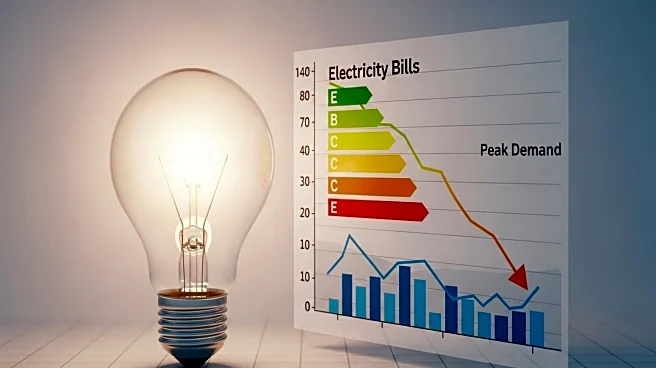What's Happening?
The Acadia Center has released a report detailing the significant impact of energy efficiency efforts in six New England states and New York. These initiatives are reportedly saving customers billions of dollars on utility bills and reducing peak demand on the region's electric grid. The report comes at a time when federal investment in energy efficiency is declining, while electricity demand is on the rise. The analysis highlights the importance of energy savings measures, particularly in appliance efficiency, which could contribute to achieving global emissions targets. The report examines investment levels and projected benefits from efficiency programs in Connecticut, Maine, Massachusetts, New Hampshire, New York, Rhode Island, and Vermont. It calls for improvements in efficiency data reporting to unlock further energy savings.
Why It's Important?
Energy efficiency is crucial for reducing electricity costs and managing peak demand, especially as federal investment in these areas decreases. The Acadia Center's report underscores the role of state energy efficiency programs as a low-cost resource, which is vital for consumer affordability amid rising energy prices. The report warns that cuts to ratepayer-funded programs could threaten these savings, highlighting the need for continued investment. The potential savings from these programs are substantial, with New England and New York expected to realize significant lifetime energy savings. This underscores the importance of maintaining and enhancing energy efficiency initiatives to support economic and environmental goals.
What's Next?
The report suggests that New England states and New York should collaborate to standardize metrics for program measurement, evaluation, and reporting. This alignment could enhance the power and impact of energy efficiency programs in the region. By adopting universal reporting methodologies and benefit-cost tests, states could improve program design and unlock new opportunities for learning and collaboration. The report also highlights the need for policymakers and program administrators to understand the evolving role of energy efficiency and shape future trajectories to meet emerging regional needs.
Beyond the Headlines
The report highlights the ethical and economic dimensions of energy efficiency, emphasizing its role in consumer affordability and environmental sustainability. As energy prices rise, efficiency programs offer a cost-effective solution to reduce system costs and support low-income households. The report also points to the potential for efficiency improvements to contribute to global emissions targets, underscoring the long-term environmental benefits of these initiatives.









